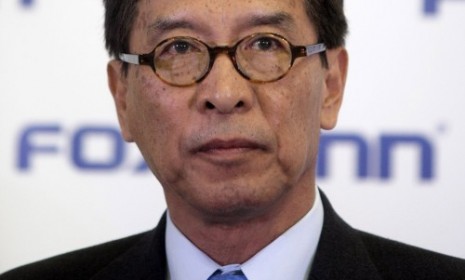Apple and the 'Foxconn suicides' mystery
Labor protesters are burning paper iPhones after a string of suicides at a Chinese factory that produces gadgets for Apple and other high-tech brands

A free daily email with the biggest news stories of the day – and the best features from TheWeek.com
You are now subscribed
Your newsletter sign-up was successful
A rash of suicides at a Southern China factory of Foxconn, "the world's largest contract maker of electronic gadgets for brands such as Apple and Hewlett-Packard" has triggered charges of worker abuse — and created a crisis-by-association for Apple. So far this year, 12 employees have killed themselves and over 20 others have attempted suicide, provoking labor protesters to burn paper iPhones outside Foxconn's Hong Kong offices while executives at the Longhua, China factory try to soothe employees with Buddhist monks and piped-in music. (Watch an al Jazeera report about the Apple suicides.) Here's a quick guide to what's going on:
When did the suicides start?
For years, Foxconn reported one or two worker suicides annually, but the numbers suddenly increased last year. In one of the first cases, a 25-year-old worker killed himself after being accused of stealing an iPhone prototype (in text messages to friends, he said he had been beaten by company security officers). Most of those who've attempted suicide since have been recent high school or vocational school graduates between the ages of 18 and 24, who sometimes work from 4 a.m. until late at night (plus overtime).
The Week
Escape your echo chamber. Get the facts behind the news, plus analysis from multiple perspectives.

Sign up for The Week's Free Newsletters
From our morning news briefing to a weekly Good News Newsletter, get the best of The Week delivered directly to your inbox.
From our morning news briefing to a weekly Good News Newsletter, get the best of The Week delivered directly to your inbox.
What caused the surge in deaths?
Nobody knows for sure. But Foxconn, which has 800,000 Chinese employees and "a reputation for military-style efficiency," recently hired 100,000 new workers in a bid to keep up with soaring demand for electronics. Labor activists say the pressure to keep up with new orders is forcing factory workers to new levels of exhaustion — in a country where long hours, low pay, and high stress are already the norm. Some people think the suicides are a form of social protest; others say suicide clusters are common among young people, due to copycat attempts. But health experts point out that Foxconn's suicide rate is actually far lower than the national rate of 14 per 100,000 people in China.
How is Foxconn fighting the problem?
It has sent psychologists and Buddhist monks to console employees, set up a suicide hot line, and opened a stress-release center where workers can hit a punching bag covered with a picture of their supervisor. The company is piping in music to calm frayed nerves. Foxconn also has brought in social scientists from Beijing's Tsinghua University and other schools to study the problem, and CEO Terry Gou is desperately searching for other ways to stop the suicides. "This guy is stressed out. They are scared," says Peng Kaiping, a social psychologist from Tsinghua who met with Gou. "He kept asking me, 'What can we do?'"
A free daily email with the biggest news stories of the day – and the best features from TheWeek.com
Is the company doing all the right things?
Not exactly. One of its less sensitive reactions was a proposal that new employees sign a contract promising not to commit suicide, and acknowledging that, if they did, their families would receive only minimal government benefits. Foxconn said the Chinese government had approved the plan, but the company backed down after a public outcry.
Sources: New York Times, Los Angeles Times, Guardian, AFP, Wall Street Journal